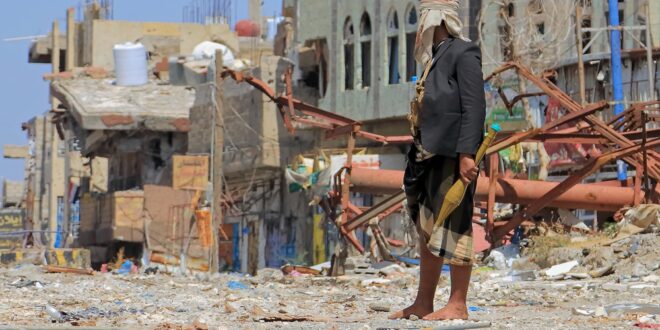If he thinks supporting the Kingdom’s efforts to take territory will help achieve a ceasefire, he’s likely in for a surprise.
Recent weeks have witnessed a string of victories for forces aligned with Yemen’s internationally recognized government, or IRG, and its Saudi and Emirati backers. Last week, the UAE-funded al-Amaliqa (“Giants”) Brigades drove Ansar Allah (Houthi) forces out of territory in the al-Bayda province. After a ten-day battle, the al-Amaliqa Brigades successfully ousted Ansar Allah forces from the province of Shabwa, and are now advancing towards the strategic city of Marib. These military gains depend heavily on close support from the Saudi Air Force.
In December, the Saudi government pleaded for air-defense systems from the United States allegedly to defend themselves from Ansar Allah’s cross-border missile attacks. At the same time, the Biden administration successfully pushed the sale of $650 million in air-to-air missiles through Congress, despite objections by some lawmakers concerned about U.S. backing for the Kingdom’s seven-year-old intervention in Yemen, by insisting that the weapons would be used only for “defensive” purposes.
The latest Saudi-backed offensives belie the Saudis’ claim that they needed American munitions to defend themselves, as well as the Biden administration’s justification for the latest weapons sale. Instead, large swathes of Yemeni territory have once again changed hands. As UN Special Envoy to Yemen Hans Grundberg told the UN Security Council on Wednesday, “there is no sustainable long-term solution to be found on the battlefield”: the escalation in violence undermines efforts to resolve the conflict.
Last year, disputes between forces backed by the Saudis and those backed by the UAE undermined their effectiveness against Ansar Allah, allowing the rebels to make the territorial gains in al-Bayda and Shabwa that the Saudi coalition-aligned forces have now reversed.
The UAE has primarily funded militias that seek an independent south Yemen, while Saudi Arabia backs the transition government that took power after Yemen’s long-time president, the late Ali Abdullah Saleh, stepped down after months of Arab Spring protests in 2011. The UAE sees a future independent south Yemen as a useful client state, given its strategic location at the southern entrance to the Red Sea, while Saudi Arabia fears that a central government controlled by Ansar Allah would render its southern border vulnerable to an Iranian presence and pressure. Iran has provided political and material support to Ansar Ansallah since the Saudi-led coalition’s 2015 intervention.
Unfortunately, Saudi Arabia’s vulnerability to transborder attacks has only increased over the course of the war, the very outcome that they initially intervened to prevent. Last July, Saudi commentators publicly criticized the UAE’s role in Yemen, a rare occurrence that signalled the dissatisfaction of Saudi Crown Prince Mohammed bin Salman with his supposed ally, Emirati Crown Prince Mohamed bin Zayed.
In 2019, Saudi and Emirati-backed forces signed the Riyadh Agreement, which sought to hammer out a functional partnership. However both sides, as well as additional separatist militias, continued to jockey for power in Aden, eroding security there, as well as basic services, and driving civilian protests and violent crackdowns last September.
The relative economic and physical security of areas controlled by Ansar Allah have attracted Yemenis to areas they control, including Sanaa, Ibb, and Dhamar. Last fall, Yemen observers wondered if Ansar Allah would further consolidate its control over northern Yemen by finally ousting Hadi government loyalists from Marib. Many expressed concerns at the humanitarian implications of such an outcome, given the large numbers of Yemenis who had taken refuge there. Now that forces backed by the Saudis and those backed by the UAE appear to be working together, Ansar Allah may be driven back from Marib and denied access to the territory’s strategic petroleum reserves.
The Biden administration may feel that these recent military successes justify its decision to expand support to Saudi Arabia by potentially pressuring Ansar Allah to agree to a ceasefire rather than risk losing more territory. That is one possible outcome, although on December 18, Ansar Allah’s foreign minister, Hisham Sharaf, reiterated his government’s openness to a ceasefire provided that after Saudi Arabia first lift its blockade on Hodeidah port and the Sana’a international airport.
The Saudis have sustained the blockade based on UN Security Council Resolution 2216, which justifies a Saudi role in preventing the smuggling of arms to the insurgency. The same resolution also requires the reinstatement of President Hadi, who has lived in exile virtually continuously in Riyadh since 2015. Recent reports indicate that the UK, the UN’s pen-holder for Yemen, may introduce a new Security Council resolution that would allow for Hadi to be replaced. A politician less tarnished by corruption, such as his prime minister, Maeen Abdul Malik Saeed, presents an alternative: Saeed was born in Taiz, in central Yemen and is seen as a technocrat and possibly a compromise figure.
A new UN Security Council resolution would offer an opportunity for the international community to put forward a more realistic framework for resolving Yemen’s long-running conflict. Resolution 2216 demands that Ansar Allah give up their weapons and all territory seized since 2014, terms which they have always rejected and to which they will almost certainly never agree. Unfortunately, the latest gains by the Saudi-led coalition may embolden them to insist on these terms, as they have for the past seven years, rather than accept that the war in Yemen, often described as the “world’s worst humanitarian crisis,” will continue to drag on until all parties find more compelling reasons to come to the negotiating table.
Last February, President Biden pledged to end U.S. support for the Saudis in Yemen, “including relevant arms sales.” Instead, his administration’s actions thus far appear to have perpetuated the conflict, harming both U.S. interests and the lives and futures of Yemenis.
 Eurasia Press & News
Eurasia Press & News



